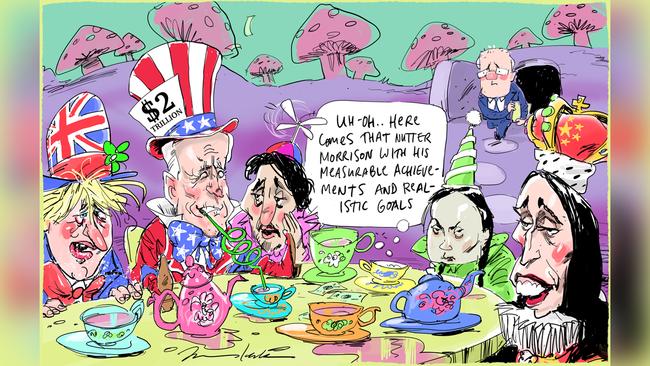
The US President certainly has moved the dial by refocusing attention on 2030 rather than empty promises of what can be done mid-century.
But the heavy lifting in terms of promises has been one-way traffic.
Mr Biden has doubled the US effort with a target of 50 per cent cut to carbon dioxide emissions by 2030 and opened its wallet to the tune of $US15bn a year in finance for developing countries.
Japan, the EU, Britain and Canada have promised to do more. China, India and Russia, the world’s biggest and third- and fourth-biggest emissions countries, turned up to the Biden summit empty-handed.
As things stand, China and India can continue to increase emissions over the period that the US has said it will cut its own by half.
This is all in keeping with the Paris Agreement focus on historic emissions and different responsibilities between the developed and developing worlds.
Meanwhile, Scott Morrison has been criticised for telling other leaders it is action not words that matter.
But the example we do not want to follow is Canada.
Compared to Australia’s carbon dioxide emissions cuts of 19 per cent from 2005 levels Canada’s record is zero.
Prime Minister Justin Trudeau vowed at the Biden summit that Canada would slash emissions by 40 per cent to 45 per cent by 2030 compared with 2005 levels, a major increase from its previous pledge of 30 per cent.
But Canada’s efforts have been dismissed as totally inadequate by climate groups, despite the country having a carbon tax scheduled to reach $170 a tonne by 2030.
In total, Canada has 14 different carbon pricing mechanisms, with another two planned.
This includes six carbon tax programs, six baseline-and-credit systems, and two cap-and-trade systems.
The federal government has developed a fuel tax, often called the “pollution price”, and federal baseline-and-credit system for industrial facilities that apply in provinces and territories that haven’t developed their own carbon pricing programs.
The federal carbon tax is currently $30 a tonne of CO2 and it will increase $10 a year in April until it reaches $50 per tonne in 2022, and then $15 per year until it reaches $170 in 2030.
Where Scott Morrison is criticised for not having targets, Canada is forgiven for missing targets but criticised for not making them higher and for failing to give more money to developing nations.
It remains to be seen how successful the Biden summit will actually be.
While Mr Biden is basking in having brought the world together on Skype, he is yet to navigate his big-spending plans through congress.




Joe Biden’s climate summit has confirmed the global divide under which developed countries pledge action and pay for others to watch from the sidelines.